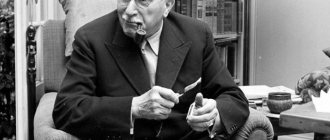The explanation of how an individual differs from a person lies in the duality of human nature. A person is born with a set of unique characteristics and properties. One can speak of a baby only as an individual, a representative of the species Homo sapiens. Life in society gives each individual the opportunity to socialize, develop their natural inclinations and form personal qualities. We can talk about such characteristics of a person as personality and individuality only when he is a full member of society.
Numerous examples from life, when, for various reasons, small children find themselves in the company of animals, confirm that the development of man as an individual continues according to general laws. The child grows, but does not acquire personal qualities, as he is deprived of human communication. This confirms the significant role of socialization in the formation of personality.
Man as a biological species
| From a social science point of view Human is a representative of the species Homo Sapiens, who is endowed with upright walking, self-awareness, speech, the ability to acquire social skills, and have not only biological, but also spiritual needs. Read also: What qualities characterize a person? |
On the one hand, people, like animals, have instincts, but on the other hand, they are strikingly different from other representatives of the animal world. In the very definition of the concept “human”, social science contains information about the biological and social essence of Homo Sapiens. The social component is precisely the main difference between humans and animals.
Individual characteristics
Having enormous potential for self-development and development as an individual, every person, after birth, manifests himself in certain properties. This is called individual development.
In social science, the concept of “individual” is used to denote the specific characteristics of an individual person. Firstly, each subject has unique external characteristics, eye color and bodily constitution, that is, he acts as a single representative of the species homo sapiens. Secondly, psychological differences can be identified between individuals: emotionality, temperament, character. Thirdly, everyone has a set of specific abilities.
From the point of view of some experts, the fetus in the womb already develops a peripheral and central nervous system in the second month. At five months, the embryo acquires the ability to hear and distinguish sounds, and in the third trimester it can already experience emotions (get scared, react to affection, conversations). Scientists insist that it is in the last months of gestation that the child’s intellectual abilities and psycho-emotional background are formed.
Therefore, there is an opinion that the formation of an individual begins not after birth, but immediately at the birth of a new life. We can briefly highlight its characteristics:
- high level of social activity;
- environmental sustainability;
- psychophysical unity of the organism.
The concept of “individual” in psychology is distinguished from the term “individuality”. It means a set of properties and features that determine the uniqueness of the subject. It manifests itself not only in behavior, but also in the specifics of preferences and interests. Individuality is formed in the environment in which the subject grows and develops, his associations acquired at an early age, and the characteristics of his upbringing. Psychologists say that one is born as an individual, one becomes an individual, and individuality must be defended.
The result of the development of an individual is a personality that is considered as an exclusively social entity.
What have we learned?
The concepts of man, individual, personality, individuality are united by the fact that they all characterize people as biological and social beings with natural properties and qualities acquired in the process of life and interaction with other members of society. Such a system of concepts helps to organize the properties of a person and examine him from different sides. An individual is a biological being, one of all people. Personality – possessing a number of social qualities. Individuality – having a set of properties and characteristics that is unique in nature. Each person is an individual, personality and individuality.
conclusions
Having answered the question of how a personality differs from an individual and individuality, we can conclude that these definitions, or rather characteristics, are closely intertwined with each other. A person receives individual properties and qualities at birth, but an understanding of all the features of life in society comes to him in the process of growing up, not only physically, but also psychologically. Social institutions contribute to the comprehensive development of the subject, and throughout his life he faces an important task - to preserve his individuality and remain an individual.
How does personality differ from individuality or individual?
The main difference is maximum self-awareness and the ability to control one’s own actions, take responsibility for them, and make decisions. The peculiarity is in willpower, which is expressed not in the desire to be different from others, but in the desire to become better than oneself. Usually, personal qualities, although they are manifested in comparison with others, are assessed by the person himself in relation to himself. That is, for example, the abstract “I” stole and has pangs of conscience not because a neighbor/friend or a policeman said that this should not be done. The reason is the awareness of values and their violation. The individual will be ashamed first of all of himself.
What is individual?
The main difference is the lack of specific, unique features. This is a person who belongs to the crowd, has similar characteristics, conforms to basic stereotypes and is susceptible to public opinion.
Such a person has not grown personally. At the everyday level, we can cite the following traits of an individual who never became a person:
- inability to make decisions;
- lack of responsibility for events;
- low social adaptability;
- following the opinion of the majority;
- lack of point of view;
- the ability to manipulate the person in question.
Strong personality
Throughout life, a person can find himself in extreme situations, which become a test of how strong his inner core is - individuality and personality. How rooted and part of the “I” are his beliefs, principles, worldview, etc.
Austrian psychiatrists Bruno Bettelheim and Viktor Frankl, who were imprisoned in concentration camps during World War II, wrote that a person’s very life sometimes depends on the preservation of individuality. The conditions of the concentration camps led not only to physical exhaustion, but also to the destruction of personality - the goal of the fascists was to lower prisoners to the level of an individual occupied only with biological needs. In practice, although such an individual became an “ideal” obedient prisoner, he quickly lost the will to live, memory, abilities and even the instinct of self-preservation.
Frankl and Bettelheim, by their own admission, were helped to survive only by the desire to preserve their individuality - to continue mental work, to set life goals for themselves, even if their realization was unlikely at that time. So, Bettelheim, deprived of the ability to write, composed a book in his head, and Frankl, together with a group of doctors, organized a secret service for psychological assistance to other prisoners. A strong personality, as the highest stage of development, is characterized by the ability to overcome life circumstances, placing spiritual values not only above material, but also above biological needs.
Read also: How to make a pear from tires
So, we figured out what personality is in social science and how this term differs from concepts such as “individual” and “man”. In addition to the theoretical material, we offer a short test.
Group and individual
Since man is a social being, it is impossible to imagine his full life outside of society. Life in society is so organized that each individual is a representative of a variety of social groups. The most significant social groups for an individual are:
- family;
- kindergarten group;
- a group of peers in the yard;
- classroom;
- student group;
- production team;
- clubs and interest groups.
In order to feel comfortable, an individual needs to be accepted into the group. To do this, he must follow the rules established in this group:
- recognize the authority of the group leader;
- have appropriate external attributes (specific clothing style, accessories, gadgets);
- share the group’s opinion, beliefs and value orientations;
- identify with this group.
As a member of a group, an individual is constantly in a situation of choice: agree with the group or show his true colors. If an individual has charisma and leadership abilities, he feels confident even in those moments when his personal position does not coincide with the opinion of the majority of group members. He is not afraid to voice his opinion. Since he backs up his thoughts and beliefs with arguments, group members listen to him, and sometimes even take his side, changing their views.
If an individual has low self-esteem, he is afraid to express his disagreement with the opinion of the majority in the group. He is forced to pretend, wear a mask, flatter, wanting to impress the leader of the group. His behavior will remain insincere as long as it is beneficial for a person to be a member of a given social group.
The influence of a group on an individual can be seen in some professions:
- Salesman. There are certain standards for customer service, according to which the seller must be friendly, polite, and smiling. This professional standard does not allow a salesperson on the job to demonstrate his bad mood or negative attitude towards an unkempt customer.
- Teacher. There may be completely different children in a school class. Some of them have high learning motivation, while others have low motivation. The teacher, as a rule, sees children who are interested in acquiring knowledge, but he cannot teach only them. In accordance with the job description, the teacher must treat all students equally. Professional standards prohibit a teacher from picking favorites in the class. The teacher’s personal attitude towards a particular child should not leave an imprint on his teaching.
- Conveyor worker. This procession does not imply the manifestation of individuality. An employee of a factory or factory must perform certain operations in the required sequence. The group for this employee will be the production workshop. If an individual copes well with his duties, then other assembly line workers are loyal to him. If he makes a mistake, he will face sanctions from other workers, because his mistake will certainly affect their work.
The group influences the individual, shaping his system of life values and principles. But the individual also influences the group if he has sufficient personal potential. It turns out that not only the group forms certain personal characteristics of its members, but also each individual who is a member of the group influences its socio-psychological characteristics.
What is the difference between an individual and a personality?
In order to understand what “personality” is, you need to know the difference between “individual”, “individuality”, “person”.
The very definition of “individual” comes from the Latin word “individ”, which means “someone in the crowd,” but an individual is “someone” outside the crowd.
If we compare a personality and an individual, the first determines the social circle, while the second only determines his belonging to a certain group.
Social individual
Unlike young animals, the individual is practically devoid of innate adaptive instincts. Therefore, for survival and further development, he needs communication with his own kind. After all, only in society will a child be able to realize his innate potential and become an individual. Regardless of what society an individual is born into, he will not be able to do without the care and teaching of adults. For full development, a child needs a long time so that he can absorb all the elements and details that he will need in independent life as an adult member of society. Therefore, from the very first days of life, a child needs to be able to communicate with adults.
The individual and society are inseparable. Without society, an individual will never become an individual; without individuals, society simply will not exist. In the initial period of life, interaction with society consists of primary facial reactions, body language, with the help of which the baby informs adults about his needs and shows his satisfaction or dissatisfaction. The responses of adult members of a social group also become clear to him from facial expressions, various gestures and intonations.
As the child grows up and learns to speak, the language of gestures and facial expressions gradually fades into the background, but never throughout the adult life of the individual it completely loses its significance, transforming into the most important tool of nonverbal communications, which expresses feelings sometimes no less, and sometimes and more than ordinary words. This is due to the fact that gestures, facial expressions and postures are less controlled by consciousness than speech, and therefore, in some cases, are even more informative, telling society what the individual wanted to hide.
So, we can confidently say that social qualities (for example, communication) should be formed only in the process of interaction with society in general and communication with other people in particular. Any communication, verbal or non-verbal, is a necessary component for a person to become socialized. The social qualities of an individual are his abilities for social activity and the process of socialization. The earlier the socialization process begins, the easier it will be.
There are various forms of learning through which an individual is socialized, but they should always be used in combination. One of the methods that adults consciously use to teach a child to socially correct and approved behavior is reinforcement learning. Consolidation is realized through the targeted use of the method of rewards and punishments in order to demonstrate to the child which of his behaviors will be desired and approved, and which will be disapproving. In this way, the child is taught to comply with the elementary requirements of hygiene, etiquette, etc. that apply in society.
Some elements of an individual’s everyday behavior can become quite a habit, which leads to the formation of strong associative connections – the so-called conditioned reflexes. One of the channels of socialization is the formation of conditioned reflexes. Such a reflex, for example, could be washing your hands before eating. The next method of socialization is observational learning.
An individual learns how to behave in society by observing the behavior of adults and trying to imitate them. Many children's games are based on imitating the behavior of adults. Role-based social interaction of individuals is also learning. An adherent of this concept, J. Mead, believes that mastering social norms and rules of behavior occurs through interactions with other people and through various games, especially role-playing games (for example, playing mother and daughter). Those. learning occurs through interaction. By participating in role-playing games, the child brings to life the results of his own observations and his initial experience of social interaction (visiting a doctor, etc.).
Socialization of an individual occurs through the influence of various agents of socialization. The most important and first such agent in the process of social formation of an individual is the family. After all, it is the first and closest “social environment” of the individual. The functions of the family regarding the child include caring for his health and protection. The family also satisfies all the basic needs of the individual. It is the family that initially introduces the individual to the rules of behavior in society and teaches communication with other people. In the family, he first becomes acquainted with gender role stereotypes and undergoes gender identification. It is the family that develops the primary values of the individual. However, at the same time, the family is the institution that can cause the greatest harm to the process of socialization of the individual. For example, the low social status of parents, their alcoholism, conflicts in the family, social alienation or single-parent families, various deviations in the behavior of adults - all this can lead to irreparable consequences and leave an indelible imprint on the child’s worldview, his character and social behavior.
School is the next agent of socialization after family. It is an emotionally neutral environment, which is fundamentally different from the family. At school, the child is treated as one of many and in accordance with his real characteristics. In schools, children learn practically what success and failure are. They learn to overcome difficulties or get used to giving in to them. It is the school that forms an individual’s self-esteem, which, most often, remains with him throughout his adult life.
Another important agent of socialization is the environment of peers. During adolescence, the influence of parents and teachers on children weakens, along with this, the influence of peers increases. All academic failures and lack of parental attention are compensated by the respect of peers. It is among his peers that the child learns to resolve conflict issues and communicate as equals. And in school and family, all communication is built on hierarchy. Relationships in a peer group allow an individual to better understand himself, his strengths and weaknesses.
The needs of the individual are also better understood through group interaction. The social environment of peers makes its own adjustments to the value ideas instilled in the family. Also, interaction with peers allows the child to identify with others and, at the same time, stand out among them.
Since groups of different affiliations interact in the social environment: family, school, peers, the individual faces some contradictions. For example, an individual’s family values mutual assistance, but at school the spirit of competition dominates. Therefore, an individual has to feel the influence of different people. He tries to fit into different surroundings. As an individual matures and develops intellectually, he learns to see such contradictions and analyze them. As a result, the child creates his own set of values. The formed values of an individual allow them to more accurately define their own personality, outline a life plan and become an proactive member of society. The process of forming such values can be a source of significant social change.
Also among the agents of socialization it is necessary to highlight the media. In the process of their development, the individual and society continuously interact, which determines the successful socialization of the individual.
Concepts
Man is the main theme of literature and art, the semantic center of any philosophical system. Throughout the history of his existence, he tries to comprehend himself, and each time he discovers something new, unknown in himself. To express the essence of a person we use the words:
Man - there are different versions about the origin of this word from different languages:
- From Old Russian - it combines “chelo” (elevation, top) and “vek” (strength), which together reads as “possessing all strength.”
- From Lithuanian - “chelo” (top) and “vaikas” (young man) - that is, an adult man.
- From Old Church Slavonic - “celo” (whole) and “veche” (collection), which can be interpreted as “collected into a single whole.”
- There is a theory that many words came into the Russian language from Sanskrit, translated from which “challi” means descendant, brainchild.
Read also: DIY microprocessor. Part 1.1
In all theories, man is a unique integrity that combines material and spiritual principles. With his body, a person belongs to the natural world, and his soul and spirit endow him with reason, free will, individuality, and sociality. So, a person is a biosocial being with consciousness, free will and speech. He is part of nature and at the same time isolated from it, he creates society and changes under its influence.
>> Types of development, diversity of societies
Individual (from the Latin individuum - indivisible) - a designation of the individual in contrast to the general mass, an individual living being in contrast to the collective, the herd. An individual is a person as a representative of his species, a bearer of traits unique to him (biological, mental, personal), a person as such. The individual is the last link in the chain “genus – species – individual”, in which the genus and species denote a community, and the individual – a separate, independent entity. But at the same time, the individual is one of many, he is impersonal. The term applies not only to humans, but also to higher animals.
Individuality is a set of qualities and properties that determine the uniqueness and uniqueness of a person. Individuality expresses the individual’s own world, a complex of mental and behavioral characteristics inherent only to him. Man is social in his essence and individual in his mode of existence. Individuality is formed in the process of education and self-education and is the pinnacle of human and individual development.
Read also: Family, its functions, types. Marriage / Directory
Personality (from the Latin persona - mask, role of an actor) - a person as a bearer of distinctive, uniquely combined spiritual properties and qualities, with a perception of the world around him that is unique to him. A personality is a subject of relationships and conscious activity, the owner of individual experience and stable behavioral characteristics that are formed in the process of interaction with society. A personality is a single embodiment of culture, a concrete exponent of the entirety of social relations.
Let's give a terminological definition with brief characteristics
I will list the most popular words that are often confused by ordinary people. Let's take a wide range of explanations - from everyday and colloquial to scientific.
Human
First of all, this name is used in biology, history, and archeology to distinguish a biological species that has certain structural features of the body and brain. It is an upright creature endowed with cognitive abilities. The word is appropriate to use both in combination with the more social “humanity” and when contrasted with the animal world. This can be called absolutely every one of our “relatives” - from children to adults.
Characteristic features that distinguish a person from a personality:
- The result of the evolutionary process.
- The presence of consciousness and self-awareness.
- The need to be in society, the need to communicate with others like oneself.
- A single way of communication through language, that is, the work of speech recognition and speech reproduction, with the exception of those who have lost the opportunity or have not had it since birth due to their anatomical structure.
- Features of anatomy - upright posture, the presence of fingers and toes.
- The ability to use devices to achieve a goal - any objects used for their intended purpose.
Subjective meaning (that is, a person as a subject of relationships, historical process and cultural) turns a biological species into a social being.
Individual
From Latin the word individuum is translated as “indivisible.” We actually completely copied it (but the meaning of “individual” is still different).
This concept can be called every person living in a group, society and possessing qualities that make him the same as his closest relatives. However, it is an independent unit with intrinsic value. This occurs due to the uniqueness of each individual organism on two levels - physiological and psychological. These are not qualities acquired over the years, but traits that are innate - narrow or wide-set eyes, the presence of a dimple on the chin, timbre of voice or ringing laughter.
Characteristics, what is the difference between an individual and personality:
- The object of the human population cannot be alone, it is inseparable from its own kind.
- Social activity - the presence of roles, statuses, for example, husband or wife, daughter, son, mother, father or neighbor, teacher, friend.
- The ability to adapt on a psycho-emotional level to those around you – the ability to find a compromise and adapt to the demands of society.
These are any qualities that are determined in comparison with other people, in contrast or in accordance.
How personality differs from individuality and individual, examples
The term comes from the word “Person”, and in English the tracing paper from Latin is established - persona.
The definition is inextricably linked with personal qualities, that is, it continues the concept of individuum, making it even more personalized. If earlier we talked about the individual characteristics that a person had innately, now it is more correct to talk about the acquired character, which is revealed in communication and relationships with other people. It is impossible to talk about personal traits without comparison or contrast with society.
Psychologist Daria Milai
Make an appointment
The term is used in many sciences and reflects individual characteristics. Let's go through scientific areas:
- Linguistics. “Language, speech and communicative personality.” Everything can be tied into a single knot; often these three persons develop synchronously. They are all in one person. The quality can be called acquired, because the child at birth does not have speech. The first concept reflects the depth of constructed thoughts, sentences, and the structure of texts. The second explains the degree of verbal expression skill. The third is the ability to engage in various verbal interactions.
- Philosophy. In this science, the most common interpretations of the term appeared; it became a stumbling block. For the first time, the concept of “face” began to reflect a person and his inner world. Over time, philosophical wrangling, experts came to a consensus that a person, unlike an individual, has three traits: free will, reason and feelings.
- Sociology. There are many ideas, but the fundamental one is how the society in which a person lives affects his personal qualities, abilities, and character traits. This once again emphasizes the social orientation of the term.
- Psychology. Perhaps the psychological approach is the most correct. It is at the level of consciousness and the unconscious that a set of developed habits, preferences, experience, knowledge, established opinions and stereotypes of thinking appears. All these features determine a person’s attitude to nature, culture, history, and other people.
Let's give an example. Having your own opinion about the political situation means having the traits of personal development. A young man, and especially a child, can only repeat what was said or heard on TV, but not generate his own assessment.
Personality and man, what is the difference, characteristic features:
- presence of temperament;
- pronounced character - people talk about his inclinations even in infancy;
- individual abilities - they need to be developed;
- all actions have motivation.
In general, we can say that personal qualities are cultivated in oneself and controlled, adjusted independently.
Face-to-face consultation
What are the features and advantages of face-to-face consultation?
Find out more
Skype consultation
What are the features and benefits of Skype consultations?
Find out more
Individuality
The last term that is often confused within the listed definitions. Usually it is understood as personal striking features. The word has its root in the same Latin individuum, that is, “indivisible.” The differences between an individual’s personality and individuality are that the latter distinctive features can be displayed not only in behavior and psychology, but also in purely external manifestations. An example is an individual, author’s, unique style of clothing.
If you feel ordinary, one in a million, and do not find any special characteristics in yourself, this may mean:
- either you have nothing to express;
- or you don't know how.
In my personal consultations, women open up and learn to better understand themselves.
Interrelation of concepts
All of the above related mainly to the differences between the concepts under consideration. At the same time, there is a relationship between all of them, which also cannot be ignored. The concepts of “individual”, “individuality” and “personality” can be considered as stages of a person’s personal evolution. Every person becomes an individual immediately after birth. As he grows up, he acquires individuality , which consists of genetically determined and acquired properties.
Personality and individuality are formed in parallel, largely under the influence of the same factors. As an individual develops psychologically, he acquires unique traits that help him interact better with society and the environment. At the same time, all three concepts are applicable to it, which characterize it from different sides. Each person is an individual, personality and individuality. And what to call it depends on the goals and objectives set.
Personality
The first and most important quality inherent in a person is consciousness, that is, an understanding of one’s activities, the ability to set goals, dream, and reflect one’s attitude towards the world around us. They say this: “you are not born with a personality, you become a person.” The process of personality formation is called socialization.
Signs that characterize personality:
All people are individuals, but there are those who do not meet the requirements of society: a criminal personality, an undeveloped personality, and so on.
Respect for the individual. Society approves or condemns a person. The attitude towards it depends on:
- from human labor;
- from the attitude to the surrounding world;
- from his assessment of himself.
What does the term “personality” mean in social science?
The term “personality” plays an important role in social science and is studied primarily in the section “Man and Society”.
Personality is an individual person as a subject of social life, communication and activity with his own socially conditioned and individually expressed qualities.
Personality is characterized by a unique combination of the individual’s natural properties (age-sex, biochemical, neurodynamic and others) and social qualities formed in a particular environment.
The concept of “personality” allows us to consider a person as a bearer of certain social roles, and to correlate his activities with normatively established principles.
In humanistic philosophical concepts, personality is considered as the highest value for the sake of which social development is carried out.
What characterizes a person as a person
The word “personality” itself had a negative connotation, since since ancient times it has meant a mask under which a person’s true face is hidden.
Typically, the word “mask” was used to characterize a person’s social image, and most often it was used as an insult.
But a lot of time has passed, and now the word “personality” is widely used both in everyday life of ordinary citizens and in educational literature.
Manifestations of personality can be both permanent and temporary: at one moment a person can show willpower, and in another situation he can simply remain silent.
This topic is studied at school in the 6th grade, in a social studies lesson, and already in the 8th grade this topic is fully covered.
Strong personality
Often people appear in society who are called strong personalities. They are characterized by the ability to renounce personal interests in favor of other people, their homeland, and overcome serious difficulties.
Ludwig van Beethoven, a world-famous composer, lost his hearing and then his sight at an early age, but despite this, he continued to compose music and share it with others. Now his works do not lose popularity, but few people know that their author wrote literally feeling the music.
Statuses and roles of the individual
is that the first definition is a complex system of characteristics that describe a person as a full member of society. In this case, biological characteristics, human culture and social relationships are taken into account. You can become a person only by carrying out a specific type of activity and self-realization. To do this, a person needs to be psychologically formed and sensibly assess his potential necessary to achieve his goals.
Definitions
To begin with, it is worth saying that an individual or an individual is a subject that combines qualities that were received from parents or during life.
The concept characterizes a set of unique characteristics, without which a person ceases to be special. Among them, physical, psychological and social human traits stand out. The difference between an individual and a person is that in addition to physical parameters such as gender, race, eye color, and so on, this concept includes character and psychological characteristics.
Individuality, in turn, expresses all the unique characteristics of a person, which are manifested in his temperament, behavior, manners and appearance.
Each subject is individual by nature, but there are significant differences between the individual and the personality. In order to become the owner of social traits, a person overcomes life's difficulties, interacts with other people and participates in social activities. Having received a certain role in society and recognition of its members, a person becomes a person with his own distinctive characteristics. Any person can receive this status, regardless of her physical and mental abilities.
What does it mean to be an outstanding personality in social studies?
The term outstanding personality characterizes a person as strong-willed and strong, distinguished from everyone else.
The signs of such a person are obvious: willpower, determination in achieving their goals.
Most often, people perceive such a person as a standard: for example, Yuri Gagarin. After his flight, a huge number of Soviet boys wanted to become cosmonauts. This is the psychology of the crowd - the bulk always looks up to one person.
Of course, a person cannot be a bright and outstanding person without individuality: these concepts are interrelated and mutually compensate each other.
Personality qualities
An individual who is a person has come a long way from a person as a representative of a biological species to an individual endowed with social properties. An individual as a person is characterized by such qualities as:
- energy;
- uniqueness;
- creativity;
- initiative, enterprise;
- social activity;
- responsibility;
- high motivation to achieve goals;
- ability to control emotions;
- independence from the majority opinion;
- the ability to protect one's individuality.
Asya Rakhovich
Psychologist with more than 8 years of experience. Consultant on interpersonal and marital relationships, self-discovery.
Ask a Question
Socialization of the individual and personality formation
Not every person is a person. Thus, a newborn baby is already an individual, but not yet a person. Personality is formed under the influence of society, culture, and immediate environment.
Socialization is the process of an individual’s assimilation of cultural norms and social experiences necessary for successful life in society. In simple words, socialization is the transformation of an individual into a personality. Socialization continues throughout life: a person masters many social roles, his personality acquires new facets.
Everything that influences this process is called socialization mechanisms or socialization agents. These include individuals, family, environment, social institutions - school, army, state, media, etc.
Personal development
According to teachers and psychologists, the process of personality formation begins when a child turns 3 years old. The baby develops a need to do everything on his own. However, in his quest for independence, he encounters some difficulties: it turns out that he cannot yet perform most of the activities that are so interesting to him on his own. This contradiction between the baby’s desires and his helplessness causes violent negative behavioral reactions. The child is often capricious, cries, and refuses to comply with the parents’ demands.
Adults need to treat the child with understanding and patience during this period, since contradictions are the driving force of development. Several months will pass, and the baby will find the right ways to master new activities. This will be his first step towards personal development.
For an individual to become a person, special conditions are needed. Personal development occurs if:
- Parents are interested in the development of the child, so from early childhood they create a developmental environment at home. Children need to read fairy tales, sing lullabies at night, and take part in children's games. All this forms the child’s moral and ethical basis for personal development.
- The child must attend a preschool educational institution.
The degree of success of personal development is manifested in critical situations when a person faces a moral choice. A person who has been able to become a strong personality is able to overcome different life situations with dignity. He places spiritual values above material ones. He is capable of:
- refuse dubious proposals from comrades;
- show willpower;
- be purposeful in your work;
- treat your loved ones carefully.
It is impossible to justify a person’s illegal and criminal actions by the fact that he was unable to socialize and express himself in socially encouraged activities. To commit a crime or not is a choice that not an individual is capable of, but a personality. The criminals made their choice consciously. This means they are individuals.
Human
As we have already found out above, a person is a general concept that denotes a social being with consciousness and intelligence. Man was formed as a result of evolutionary development, as well as a number of socio-historical processes. Using this term, we usually mean a representative of the human race with all the qualities and characteristics inherent in the biological species Homo Sapiens (reasonable man).
From a psychological point of view, the term “human” combines biological and general social characteristics, as well as the ability to engage in various activities specific to a given biological species.
From a biological point of view, a person is a creature that differs from other mammals in such features as:
- upright posture and special body structure;
- using articulate speech to communicate;
- the presence of consciousness, the ability to understand the essence and cause of various phenomena;
- the ability to meaningfully and purposefully perform complex work in order to obtain a certain result (and not obeying instincts, as happens in animals);
- the ability to create and use tools.
From a philosophical point of view, a person is an integral system that has physical and mental principles, determined genetically. This is the unity of biological, social and spiritual qualities.
To remember how the concept of “person” differs from the concept of “personality”, you should understand one simple thing: a newborn child is already a person, since all the elements of human nature are inherent in him. At the same time, he becomes a person later - in the process of socialization, when he acquires his own individuality.
Signs of an individual
In psychology, the main distinguishing feature of the concept “individual” is the opposition of the characteristic social features of the subject of social life to the instinctive model of animal behavior. In simple terms, the difference between an animal and a single representative of the human race lies in the latter’s ability to adapt to the specific conditions of social interaction.
A person becomes an individual in the process of interaction with other people. The characteristics of an individual are:
- consciousness;
- intelligence;
- speech;
- upright posture.
What is the difference between an individual and an individual?
Every person is an individual and an individual at the same time, only this manifests itself in different life situations. A person who does not include personality is a primitive creature, on a par with primates.
For example, if you come to the bank and want to get a loan, then you provide your passport - at that moment, you are an individual.
But if you want to stand out from the crowd or be outside the crowd, then you are already an individual. An individual is defined by character and socialization in society.
Development of the individual
The development of the individual occurs constantly. The prerequisites for this process are:
- quantitative and qualitative changes occurring in the tissues and organs of the body during the growth and maturation of the individual;
- formation of personality consciousness;
- human cognitive interest;
- natural curiosity;
- communication with other representatives of a small social group in particular and society in general;
- genetic predisposition of a person to master new types of activities;
- genetically determined human ability to imitate.
Factors influencing the individual and group
Life in society and status
In the process of evolution, man occupied the highest point in the hierarchy of the animal world. In the process of development, each person goes through a certain path from an individual to a developed personality with a certain set of qualities that distinguish people from each other.
This process contributes to the formation of a certain worldview. Society greatly influences the formation of personality. If it is free, then people are distinguished by their individuality, as well as the ability to express themselves. This leads to the fact that a developed personality grows out of an individual.
A person occupies a social status and is capable of realizing it. Social status can be either temporary or permanent.
Content
- 1 Definitions
- 2 Statuses and roles of the individual
- 3 How an individual’s personality is formed
- 4 How to distinguish between definitions
- 5 Conclusions
The problem of human development in society is important not only in psychology, but also in society. Despite this, not all people can find the difference between a personality and an individual. To understand this issue and understand how these concepts differ from each other, you should turn to terminology, and also understand what individuality is.
Individual, individuality, personality - what's the difference?
Close to the term individual are two more: personality and individuality. Some even think that they mean the same thing, but this is not entirely true. Or rather, not at all like that. I will quote from a statement by A.G. Asmolov – modern psychologist and politician:
“One is born an individual, one becomes an individual, one defends individuality.”
To understand the essence of this phrase, let's take a closer look at the terms it contains.
Individual
Indeed, all people are born as individuals , as representatives of the human race. The first part of our lives we try to “fit into” society, and for this we need to comply with the norms and rules established in this society. The latter fact forces us to learn to be like everyone else through imitation of adults.
First, we understand that we need to clean up our toys after ourselves, then that we shouldn’t hit the weak, and in general it’s not good to fight. We understand that we must respect our elders, give way to the elderly, and help those in need. It’s not good to talk loudly, jump in line, and so on.
Now you know what an individual is, but what happens next? After all, people differ not only from other representatives of the living world, but also from each other, including.
Individuality
Individual, individuality, personality - this is the order in which development occurs (what is it?); you cannot immediately jump over a step. Individuality involves a unique set of qualities that distinguish a person from his “brethren.”
These are your abilities (what is this?) and talents, skills and abilities that are innate, but become fully developed only in the process of socialization (what is this?).
That is, we acquire our individuality when we grow and learn to live among others. The presence of individuality in a person does not always mean that he is a person.
Personality
In the process of this learning, the individual acquires many of his own specific characteristics and becomes a personality. It is the result of educational interaction with society.
It is important to add here that if everyone is born an individual, then not everyone becomes an individual.
If you want, this is the next stage in human mental development. Before this, you looked at others and did as they did. But the moment you decide to do something, but in your own way, and also take responsibility for this decision, a personality is born.
She knows how to set goals and achieve them in her own unique ways, and is an active and therefore effective unit in society.
The individual is self-organized, highly developed and occupies a significant place in his group or society.
How to differentiate between definitions
When wondering what the differences are between the concepts of “person,” “person,” and “individual,” many people become confused. Although these definitions are intertwined with each other, personality is the most ambiguous of them. In everyday life, this word often characterizes a person capable of performing a noble deed. In psychology, this term has more than ten interpretations. Moreover, a separate section of this science was created to study the relationships between people and individual communities.
Based on the information presented earlier, we can draw a logical conclusion that, in comparison with personality, an individual cannot be lost. His development begins from birth, and even becoming socially disadvantaged, he will retain his individuality. Forming one’s own “I” is the most important task of every person, the implementation of which depends on the beliefs of the society of which the individual is a part. Understanding one’s role in society and compliance with one’s status forms one’s personality, which can be assessed differently in individual communities.
There is a quote: “One is born as an individual, one becomes an individual, and individuality is defended.”
With its help, you can easily answer the question of what is the difference between these terms. Not every person manages to fully preserve their uniqueness. Attempts to imitate other people and conform to all the norms prescribed by society can provoke a loss of individuality. You can remain a unique person only if harmony is achieved with yourself and the world around you.
Personal qualities
The definition of “personality” is understood as a specific subject who is distinguished by the ability of cognition, self-awareness, emotional experiences, as well as the ability to influence the world around him and build relationships with other individuals. Psychologists believe that this term refers to anyone who occupies a position in society and is capable of fulfilling a certain role.
Personality cannot be formed outside of society and without connection with it; its main characteristics are the following potentials:
- informative;
- creative;
- communicative;
- value;
- art.
The will of a responsible subject, the ability to control one’s life and build relationships are considered the basis for personal development. These are individuals who understand that natural inclinations cannot control the mind, and a person must consciously guide his own behavior.
For example, a three-year-old child cannot be considered a mature personality. He is not yet aware of why he acted this way and not otherwise, and what consequences his action may lead to. He acts based on his upbringing and habits that he developed in childhood.
It is difficult to call a person who does not have a stable, solid “I” a personality. Many people live in a pattern, mechanically reacting to what is happening in the world around them, and follow exclusively their instincts. If there are adequate habits and their reasonable external manifestations, a decent person appears in society, but without his own “I”.
The formation and definition of a person as an individual is a long process that is associated with:
- with the choice of social roles and functions performed;
- awareness and acceptance of rules and norms of behavior;
- the ability to build relationships and be part of society;
- choose your behavior model responsibly and independently.
It should be understood that in society those who are capable of being different from everyone else always attract attention. But psychologists focus on those features that make this happen. One can always be called a person who knows how to stand out, but not everyone who stands out has the right to be considered a person. Only worthy behavior is the main social characteristic of a subject. Outstanding people have always been distinguished by their determination and willpower, and they are usually perceived as role models.
Who is the individual
The concept of “individual” comes from the Latin word “individuum”, which translates as “whole, indivisible”. This concept is used to describe the socio-psychological characteristics of a particular person.
A social individual is a person as a representative of society, a certain social group.
The term "individual" is used in various sciences.
- In social psychology, the individual is the basic definition around which concepts and theories of interpersonal interaction, communication, conflict resolution, and social management are built.
- In sociology, this term is used to study public opinion and the behavior of large groups. When conducting sociological surveys, researchers use the concept of “individual” to create typical characteristics of a particular age group of subjects and study the individual characteristics of representatives of a particular profession or category of the population.
- Physiologists use this term to study processes occurring in a particular organism. This concept allows physiologists to study the human body.
- In medicine, this term is used to choose treatment tactics for a particular disease in a particular patient. The causative agents of the infection may be the same, but the nature of the course of the disease in two different people will be different. Therefore, doctors take into account the individual characteristics of the patient when prescribing certain medications.
- In pedagogy, this term helps the educator or teacher implement a person-oriented approach to the child. In kindergarten, teachers create a developmental subject environment in which every child can satisfy his needs for knowledge of the world around him, in engaging in activities that he likes. A teacher at school must not only provide students with material on one or another discipline of the curriculum, but also create conditions for the creative self-realization of each of them.
- In geography, the concept of an individual is used as a unit for measuring population density and studying the ethnocultural characteristics of a particular people.
- In history, with the help of the term “individual”, an idea of a particular era or historical event is formed. Thanks to this concept, historians have been able to create psychological portraits of outstanding figures.
- In art, the concept of the individual formed the basis of different directions. The features of a particular genre in literature, music, and painting did not appear spontaneously. They are the result of the activities of brave individuals who were able to successfully realize their creative potential.
Myers-Briggs developed a concept according to which all people can be divided into the following types:
- sensory extrovert (vividly expresses himself, self-confident, socially active);
- sensory introvert (friendly, sociable, charming);
- intuitive extrovert (they talk a lot, but do little, live in dreams and discussions about possibilities, like to make grandiose plans, but do not implement them);
- intuitive introvert (makes decisions based on his own feelings);
- thinking extrovert (loves clarity, algorithms, logic, rationality in everything);
- thinking introvert (socially passive, uncommunicative, but generates brilliant ideas);
- feeling extrovert (tends to give advice, criticize);
- feeling introvert (prone to vivid experiences and emotional outbursts);
- decisive extrovert (impulsive, speaks first, thinks later);
- decisive introvert (calm, reserved, reasonable);
- perceiving extrovert (overflowing with vital energy, easy-going);
- a perceptive introvert (a creative person who draws inspiration from the world around him).
How psychologists view this term
An individual is called the exact bearer of all the traits that are given to humanity. But in psychology, the term individual is characterized by the integrity of the psychophysical organizations of the body, its activity, as well as resistance to manifest actions.
A person lives as an individual from the beginning of his birth until the moment of death. This condition is the initial one on the planet from the point of view of its phylogenetic formation, as well as ontogenetic development. It is a concrete product of the creation of life, which actively interacts with a variety of surrounding criteria, and not a series of conditions that appeared suddenly. One thing is clear: it is impossible to consider a personality without close attention and emphasis on his individual characteristics.
They thus act as the foundation of human content. It is on them that a number of conditions for the development of each representative of the human race will depend, that is, on the inclinations that were invested in him at the genetic level. An individual has a number of basic functions, and specifically there are two of them. One is classified as conservation, thanks to which the process of distribution of energy and dynamic characteristics occurs, as well as a number of resource characteristics. But the other one is responsible for the function of so-called changes, from the point of view of plasticity of behavior.
Expression of individuality
The concepts of “personality and individuality” cannot be identified, since the first concept is a characteristic of the second. It is individuality that gives a person a set of unique properties and traits that distinguish him from the social mass.
Personality is an expression of an objective assessment of a person and his compliance with society, and individuality is self-esteem, a subjective perception of oneself from the point of view of acquired qualities.
A person can show his individuality in different areas of activity: in profession, in creativity, in communication. Individuality makes it possible to demonstrate versatile abilities while maintaining the integrity of the psyche.
A person’s individuality is in constant dynamics, manifesting itself in various unexpected situations and conditions. A person’s individual qualities find their vivid expression at critical moments, when it is necessary to quickly make a non-standard decision or take responsibility. At the same time, society’s assessment will not always be positive. The reaction from the outside is an additional stimulus for the development of the subject, determining its direction.
If there is a stop in development, then we can talk about degradation. Its causes can be internal motives, as well as the influence of external factors, when suppression or submission to someone else’s will occurs, excluding the choice of actions or deeds.
Man, individual and personality are key concepts in psychology, which are no less important in social science, since man is the main element of society. What is the difference in these three terms?
Correlation of the concepts “individual”, “individuality”, “personality”
Man is noticeably different from all living beings. Personality, individual, individuality - these concepts can divide people into several categories, which makes them more complex in relation to other representatives of the animal world.
Any creature that belongs to the human race can be called by one term - an individual. But not every creature can be called a person. As mentioned earlier, to become a person, you must be highly developed. Also lead an active and successful life in society. That is, the concepts of “individual” and “personality” are not related. They are in a sense opposite. The same can be said about the relationship between the terms “individual” and “individuality”. The last concept characterizes personality. Individuality is an indicator of a person’s highly developed state.
The relationship between the concepts “individual”, “individuality”, “personality” should be considered as a kind of human evolution. At birth, he is in the first stage of development. Over time, he gains new properties that are mixed with his genetic information. It becomes unique, that is, it acquires individuality. Later he develops psychologically, becomes conscious, active, responsible, capable of successful interaction with the social environment. He can already be called a personality.
Thus, people can be divided into two broad categories. A non-developing person who uses only the basic properties given by nature, an uneducated person who does not play a special role in society, belongs to the first group. This is an individual. Individuality, personality - in psychology, these concepts characterize socially active people and form the second category.
What is an archetype in psychology and familiarity with Jung's prototypes?
The concepts of man, individual, personality, individuality definitions and characteristics
Let's start with the fact that the definition of “human” means a person as a biological species that embodies an example of evolution and has consciousness. A person, as a social object, has a way of communication - language, but it is worth noting that not every person is an individual.
Characteristics of a person as a biological object:
- body anatomy,
- the ability to create tools or the fruits of one's labor,
- presence of consciousness and awareness.
From here we can determine that a person is a representative of his species and that means he is an individual.
An individual is a subject who has all the social qualities that are inherent in a particular group.
Characteristics of an individual as an object of the human population:
- activity in the social environment,
- psychological stability,
- adaptability of psychophysical characteristics.
A personality is a person endowed with certain qualities and character that were formed through interaction with society. She is able to experience feelings, be aware of what is happening and herself in the world, and also form relationships with society according to her beliefs.
As a rule, people are not born as individuals - they become them. The human factor plays a huge role in this aspect.
There are the following factors influencing the development of personality:
- heredity,
- circle of friends,
- character,
- upbringing,
- personal worldview.
Individuality is a set of physiological, psychological, social qualities of a person that are unique. Of course, each of us is unique, but it is worth noting that some have strong individual traits, while others do not have them at all.
Conclusions website
- Interaction with society. To remain an individual, a person just needs to be himself. But he can become a person only through social interaction, which manifests itself either in cooperation or in confrontation.
- Adequacy. Every person is born an individual, but he becomes a personality only in the process of conscious life.
- Quantity. There are about 7 billion individuals in the world, and individuals, according to various estimates, from several hundred to several tens of millions.
- Confession. Every person has equal rights with other people, that is, his right to individuality is inalienable. However, individuals express themselves somewhat more clearly, receiving certain social privileges (authority, power, recognition).
- Mindfulness. To remain an individual, it is enough to simply live, fitting into the framework of society or isolating yourself from it. The path to personality development is a conscious action, accessible only to a select few.
In psychology and sociology, the problem of human formation, which is associated with the stages of his growing up, is very important. The separation of the concepts of individual and personality is the cornerstone of assessing a person’s activity
People are not only born unique, but also become unique in the process of life. To the question “what have you achieved?” Almost every person answers differently. An individual is a unique combination of human properties received from his parents at birth and acquired during his life. This concept is characterized by integrity: a set of qualities without which a person will lose his identity. Special traits include details such as gender, age, height and weight, character, eye color, skull shape and much more. A personality is a unique representative of the human race that has manifested itself in socio-cultural action. This is a stable system of traits that manifests itself only in the process of living in society. A person who is on a desert island retains his identity, but becomes a person only through the recognition of other members of society. This property is best manifested in Indian culture: having performed a significant action, a person receives a name, that is, public support. Each person is an individual by nature, and he becomes an individual in the process of growing up and communicating with other people. At the same time, the preservation of the human genetic code, its transmission and development is carried out according to the will of nature. But any representative of the human race can become a person, even if he has limited capabilities (no limbs, internal organs, speech, hearing). You can remain an individual regardless of how others treat you. But recognition, authority, characteristic of an individual are those “medals” that only society can award. Torn out of society, a person quickly loses his individual traits, ceases to understand other people and even forgets his language. At the same time, the need for personalization and uniqueness is one of the highest human needs.
What is individuality?
Individuality is what sets you apart from others. Some things are given from birth, and some appear later. Is it possible to shape your individuality consciously? Can. A striking example of this is informal youth movements. The protest in this case serves as a manifestation of the individuality of each participant.
But in a group with the same clothes, hairstyles, hair color and similar behavior, individuality is erased, because there is no one to be different from - everyone is similar to each other. If an Emo girl appears surrounded by ordinary street gopniks, she will show her individuality, but in her environment it will be little noticeable. The most striking example from folklore is the comparison with a white crow in a flock of black birds.
Is individuality necessarily manifested in the form of protest and outrageousness? Not at all, but this is the most telling example. Even the most modest man in the street has his own individuality - temperament, character, appearance, manner of speech. It is this set that distinguishes one person from another, and not only humans. Beasts and animals also have individual characteristics.
Even twins who are absolutely identical at first glance are also individuals from birth, although this is not so noticeable, and rather relates to temperament, health and weight, and over time they turn into completely different personalities.
Only completely identical, cloned creatures can be completely devoid of individuality, but science has not yet reached this point.
The definition of individuality sounds like a set of certain qualities inherent in a particular creature, constituting its originality, making it unique.
What is individuality
Any person has both common characteristics inherent in the entire human race, and something that distinguishes him from all other people. Moreover, these differences exist even in identical twins. And the older they get, the more differences that are associated with individual, unique experiences. Individuality is what sets a person apart from his environment, reflects his uniqueness.
And every person, regardless of age, mental state and health, has such unique traits and characteristics. This also applies to newborn babies, who are also not alike either in temperament or in emotional reactions. Moreover, all living beings that have higher nervous activity have individuality. It is this set of unique traits and qualities that is often confused with the concept of “personality.” If only a person can be an individual, and therefore a person, then dogs, cats, horses, parrots, and even guinea pigs have uniqueness.
A person’s individuality is manifested in almost all spheres of his psyche and activity:
- in the uniqueness of the emotional sphere: level, activity, forms of manifestation of emotions;
- in individual psychological characteristics of temperament and character;
- in the level and nature of intelligence;
- in the characteristics of activity and activity;
- in the characteristics of cognitive processes: memory, attention, thinking, imagination, creativity;
- in motivation of behavior;
- in inclinations and abilities;
- in communicative qualities: the level and nature of communication, the degree of conflict, forms and methods of communication, etc.;
- in the nature of social interaction;
- in interests, needs and opportunities;
- in ideology, moral principles, interests and beliefs.
And the more a person stands out from the homogeneous crowd, the brighter his individuality. It is individuality that determines the nature of a person’s activity in society, success and ways to achieve it. Individuality is also assessed in a person by other people, although not all of its manifestations are equally useful for both society and the person himself.
And a bright personality does not always mean a pleasant, productive person. Sometimes individuality manifests itself in antisocial behavior, the desire to shock, and violation of generally accepted norms. Then society applies social sanctions to such an “original”. Yes, one might say, he is being driven into the framework of generally accepted norms, his individuality is being limited. But these are the laws of society, and one can live normally in it only by obeying these laws. It is society that sets the framework for the manifestation of individuality.
Thus, a person is a complex multi-level system of properties, qualities and characteristics. And the concepts of “individual”, “personality” and “individuality” reflect different manifestations of this system. And like any elements of the system, they are not interchangeable, but interconnected.
The explanation of how an individual differs from a person lies in the duality of human nature. A person is born with a set of unique characteristics and properties. One can speak of a baby only as an individual, a representative of the species Homo sapiens. Life in society gives each individual the opportunity to socialize, develop their natural inclinations and form personal qualities. We can talk about such characteristics of a person as personality and individuality only when he is a full member of society.
Numerous examples from life, when, for various reasons, small children find themselves in the company of animals, confirm that the development of man as an individual continues according to general laws. The child grows, but does not acquire personal qualities, as he is deprived of human communication. This confirms the significant role of socialization in the formation of personality.
Individual behavior
Behavior is a special form of activity of the human body, which masters the environment. In this aspect, behavior was considered by I. Pavlov. It was he who introduced this term. With the help of this term, it has become possible to display the sphere of relationships between an individual interacting individual and the environment in which he exists and interacts.
Individual behavior is the individual’s reaction to any changes in external or internal conditions. It can be conscious or unconscious. Human behavior develops and is realized in society. It is associated with goal setting and speech regulation. The behavior of an individual always reflects the process of his integration into society (socialization).
Any behavior has its reasons. It is determined by the events that precede it and cause a certain form of manifestation. Behavior is always purposeful.
An individual's goals are based on his unmet needs. Those. any behavior is characterized by the goal that it seeks to achieve. Goals perform motivating, controlling and organizational functions and are the most important management mechanism. To achieve them, a number of specific actions are performed. Behavior is also always motivated. Whatever the behavior, challenging or detached, it necessarily contains a motive that determines the immediate form of its manifestation.
In the process of technological progress in modern science, another term has appeared - virtual behavior. This type of behavior combines theatricality and naturalness. Theatricality is due to the illusion of natural behavior.
The behavior of an individual has the following characteristics:
- level of activity (initiative and energy);
- emotional expressiveness (the nature and intensity of manifested affects);
- pace or dynamism;
- stability, which consists in the constancy of manifestations in different situations and at different times;
- awareness based on understanding one’s behavior;
- arbitrariness (self-control);
- flexibility, i.e. changes in behavioral reactions in response to environmental transformations.











